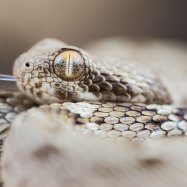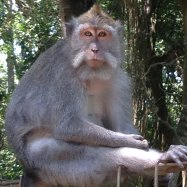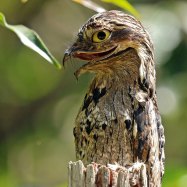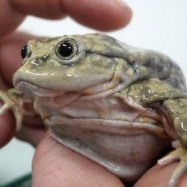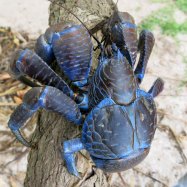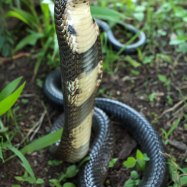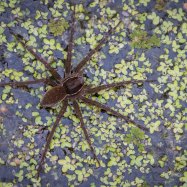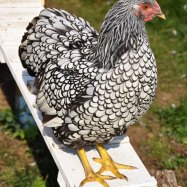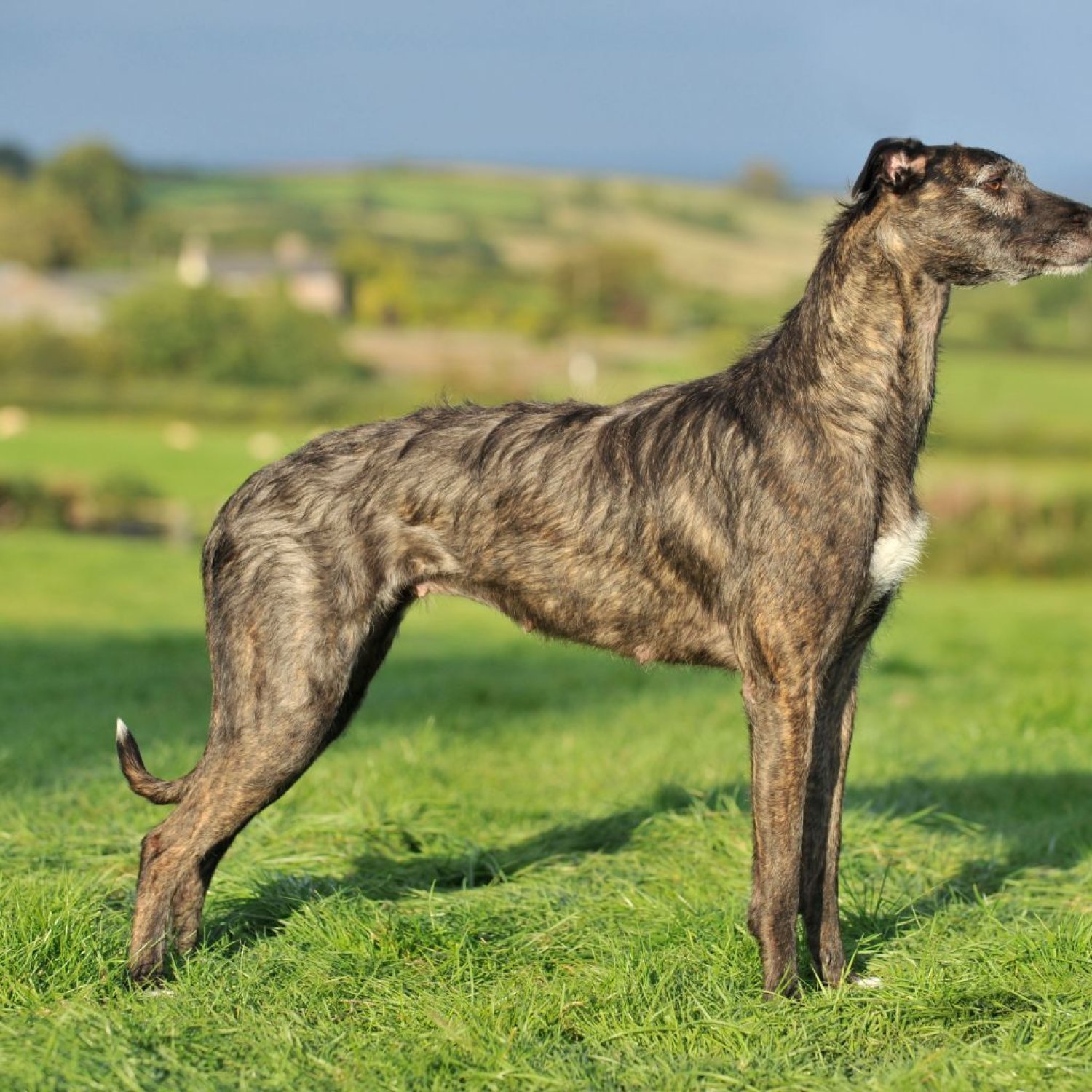
Lurcher
Varies depending on breed
Lurchers are a popular breed of dog, known for their sleek and athletic build, belonging to the Canidae family. They come in various sizes and shapes, making them a unique and diverse pet. Their lengths can vary greatly depending on the breed, and they can be found in many homes around the world. Whether big or small, these lovable animals make great companions. #Lurcher #Canidae #Pets
Animal Details Summary:
Common Name: Lurcher
Kingdom: Animalia
Habitat: Varies depending on the environment
Meet the Lurcher: The Sighthound with a Heart of Gold
Lurchers may not be as well-known as other dog breeds, but don't let that fool you. These sighthounds are an incredibly special and unique breed, with a fascinating history and an even more intriguing personality.A History Steeped in Tradition
The Lurcher is believed to have originated in the United Kingdom in the Middle Ages, although their true origins are still debated. They were primarily bred for their hunting prowess, utilizing their speed and agility to catch small game such as rabbits, hares, and even birds Lurcher.Their name is said to have derived from the word "lur," which means to skulk or move stealthily. This is a fitting name for a breed known for their quiet and graceful movements while hunting.
A Crossbreed of Speed and Intelligence
The Lurcher is not a purebred dog but is instead a cross between a sighthound, such as a Greyhound or a Whippet, and another breed, most commonly a herding or working dog. This unique mix results in a dog with the speed and agility of a sighthound and the intelligence and trainability of a herding or working breed.This combination makes Lurchers not only excellent hunters but also versatile and loyal companions. Their intelligence and trainability make them well-suited for a variety of activities, such as agility, obedience, and even therapy work.
A Look That Varies Wildly
One of the most fascinating aspects of Lurchers is their physical appearance. As a crossbreed, they do not have a set standard for their appearance, and therefore, they can vary widely in size, color, and coat type. Generally, Lurchers have a sleek and athletic body shape, similar to that of a Greyhound, but can also have a more muscular build if they have a working breed in their bloodline Leafcutter Bee.Their coat can range from short and smooth to long and fluffy, depending on the breeds they are crossed with. As for color, Lurchers can come in a variety of hues, including black, white, brindle, and even merle. This unique combination of physical traits makes each Lurcher truly one-of-a-kind.
Not Your Average Couch Potato
While Lurchers may be known as excellent hunters, they are also highly adaptable dogs that can thrive as family pets. However, this does not mean they will be content with a sedentary lifestyle. Lurchers still retain their hunting instincts and have a high level of energy and stamina, making them best suited for active households.They require daily exercise, such as walks, runs, or playtime in a securely fenced yard. They also excel in activities that challenge their physical and mental abilities, such as lure coursing, flyball, and agility. But once they have had their exercise, Lurchers are happy to curl up on the couch with their humans and relax.
A Gentle and Loving Nature
Despite their hunting heritage, Lurchers are known for their gentle and loving nature. They make excellent family dogs and are especially patient and kind with children. Due to their sighthound background, they have a high prey drive and may not do well in households with small animals, such as cats or small dogs. However, with proper socialization and training, they can coexist peacefully with other pets.Lurchers are also incredibly loyal and devoted to their families. They crave human companionship and may become anxious or destructive if left alone for long periods. It is important for potential Lurcher owners to be aware of this and make sure they are able to provide the attention and love these dogs need.
A Home is Where the Heart is
Lurchers are not picky when it comes to their living arrangements. They can adapt to various living situations, such as apartments or suburban homes, as long as they have access to daily exercise and quality time with their owners. Their coat is low-shedding, making them suitable for allergy sufferers, and their calm demeanor makes them well-suited for apartment living.However, it is essential to remember that Lurchers are sighthounds and have a strong instinct to chase after prey. It is crucial to keep them on a leash or in a securely fenced area to prevent them from running off after any small animals they may see.
Training a Lurcher: A Delightful Challenge
As mentioned earlier, Lurchers are highly intelligent dogs, making them relatively easy to train. However, their high prey drive and independent nature can also make them a bit challenging to handle at times. It is essential to have a firm but gentle approach when training a Lurcher, as harsh or forceful methods can have adverse effects on their sensitive personalities.Early socialization and positive reinforcement training are crucial for Lurchers, especially if they will be living in a household with other pets. It is also essential to remember that Lurchers respond best to training methods that engage their minds and challenge them physically. Patience, consistency, and plenty of treats are key when working with a Lurcher.
A Forever Friend
Lurchers have a lifespan of around 10-12 years, and during that time, they will become a beloved and cherished member of any family. Their loyalty, affectionate nature, and adaptable personalities make them perfect companions for individuals or families of all sizes. They thrive on love and attention and will return it in spades to their owners.Lurchers are also known for their easy-going and calm demeanor, making them suitable for first-time dog owners. With proper care, training, and socialization, they can grow into well-behaved and loving dogs that will bring joy and happiness to their owners' lives.
Adopting a Lurcher: Saving a Life
Lurchers may not be as well-known as other dog breeds, but unfortunately, they are not immune to the fate of many shelter dogs. Due to their hunting background, they are sometimes viewed as disposable once they are no longer useful to their owners.However, this means there are many Lurchers in shelters and rescue organizations that are in desperate need of loving homes. Adopting a Lurcher not only means gaining a loyal and loving companion, but it also means saving a life. These dogs are grateful for a second chance and will show their appreciation through endless love and affection.
A Heart of Gold
In conclusion, Lurchers may not be the most well-known or popular breed, but they have a heart of gold that sets them apart from the rest. Their unique combination of speed, intelligence, and gentle nature makes them one of the most fascinating and beloved dog breeds.Whether you are an active individual looking for a companion for your adventures or a family in need of a loving and loyal pet, a Lurcher may be the perfect addition to your life. Adoption is always a great option when looking for a furry friend, and by choosing to adopt a Lurcher, not only will you be gaining a devoted companion, but you will also be making a difference in an animal's life.

Lurcher
Animal Details Lurcher - Scientific Name: Canis lupus familiaris
- Category: Animals L
- Scientific Name: Canis lupus familiaris
- Common Name: Lurcher
- Kingdom: Animalia
- Phylum: Chordata
- Class: Mammalia
- Order: Carnivora
- Family: Canidae
- Habitat: Varies depending on the environment
- Feeding Method: Carnivorous
- Geographical Distribution: Worldwide
- Country of Origin: United Kingdom
- Location: Various locations as pets
- Animal Coloration: Varies widely
- Body Shape: Sleek and athletic
- Length: Varies depending on breed

Lurcher
- Adult Size: Medium to large
- Average Lifespan: 10-15 years
- Reproduction: Sexual
- Reproductive Behavior: Mating season varies depending on breed
- Sound or Call: Varies depending on breed
- Migration Pattern: Non-migratory
- Social Groups: Varies depending on breed
- Behavior: Intelligent, friendly, and loyal
- Threats: Varies depending on the environment
- Conservation Status: Not evaluated
- Impact on Ecosystem: Varies depending on the environment
- Human Use: Companion animal, hunting, and racing
- Distinctive Features: Long legs, deep chest, and slim body
- Interesting Facts: Lurchers are a type of dog breed that originated in the United Kingdom. They are a crossbreed between a sighthound, such as a Greyhound or Whippet, and a working dog, such as a Terrier or Collie. Lurchers are known for their athleticism, speed, and agility. They were traditionally used for hunting rabbits, foxes, and other small game. Lurchers are often kept as companion animals and are known for their friendly and loyal nature. They require regular exercise and mental stimulation to stay happy and healthy.
- Predator: Varies depending on the environment
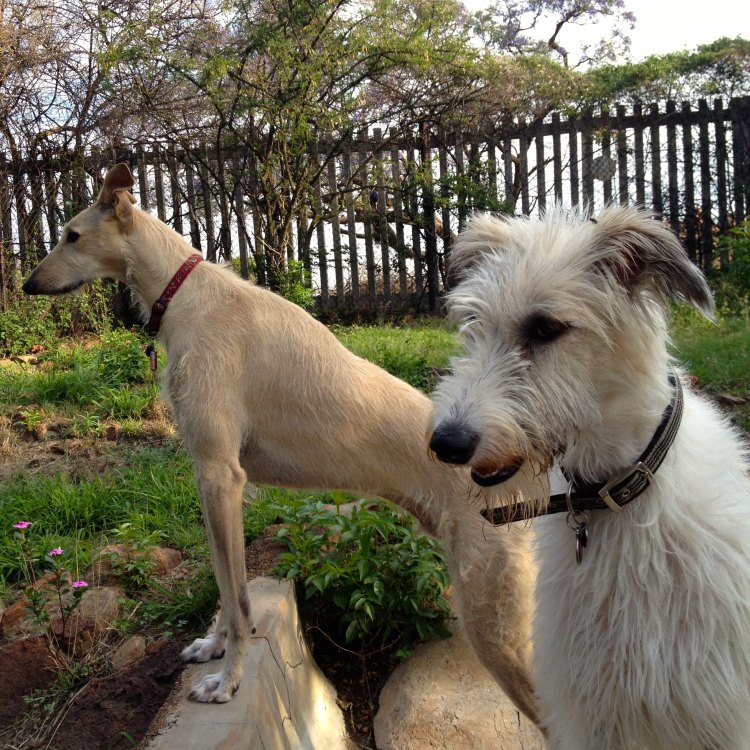
Canis lupus familiaris
Welcome to the World of Lurchers: The Unique Crossbreed Behind the Athletic and Loyal Companion
The world of dogs is vast and filled with diverse breeds, each with its distinctive characteristics and history. One such breed that stands out from the rest is the Lurcher. These medium to large-sized dogs have a unique origin story and an unmatched combination of athleticism and loyalty. In this article, we will delve into the fascinating world of Lurchers and uncover what makes them such a remarkable breed PeaceOfAnimals.Com.Lurchers are a type of dog breed that originated in the United Kingdom, specifically in Scotland and Northern England. They were developed in the late 19th century and are a cross between a sighthound and a working dog. The sighthound, often a Greyhound or a Whippet, brings speed and agility to the mix, while the working dog, such as a Terrier or Collie, provides intelligence and adaptability. This breeding was done to create a dog with the perfect combination of athleticism, speed, and agility, making them ideal for hunting small game, such as rabbits and foxes.
One of the most distinctive physical features of Lurchers is their long legs, deep chest, and slim body. These physical attributes give them a sleek and elegant appearance, making them stand out from other breeds. Due to their crossbreeding, their appearance can vary significantly, with some resembling sighthounds more and others leaning towards working dogs.
Lurchers have an average lifespan of 10-15 years, which is typical for medium to large-sized dogs. They reach maturity at around 18 to 24 months and can weigh anywhere between 35 to 80 pounds, depending on their size and breeding Lionfish. As for their reproductive behavior, Lurchers follow the same pattern as most dogs, with sexual reproduction and a varying mating season depending on the breed.
When it comes to social behavior, Lurchers can be quite unique as it varies depending on the breed. Some Lurchers have a pack mentality, and they thrive in social groups, while others prefer to be the only dog in the household. It all depends on their genetic traits and upbringing. However, one thing that remains consistent across all Lurchers is their intelligence, friendliness, and loyalty. These dogs form strong bonds with their owners and are fiercely protective of them.
Lurchers are also known for their distinctive sound or call, with some breeds being more vocal than others. Due to their sighthound gene, they have a keen sense of sight and hearing, making them excellent hunting companions. However, Lurchers are not just used for hunting; they also have a history in racing, where they competed in coursing events. This sport involves chasing and catching a mechanical lure, challenging their speed and agility.
Being a hybrid breed, Lurchers can exhibit different behaviors and temperaments depending on their lineage. However, they are commonly described as intelligent, gentle, and eager to please. They are also highly adaptable and can do well in various living environments, as long as they receive proper exercise and mental stimulation. Without these, Lurchers can become bored and destructive.
In terms of threats, Lurchers, like any other breed, can face different risks depending on their environment. For example, in rural areas, they may encounter predators such as foxes or other wild animals. In urban settings, they may face dangers such as traffic or confrontations with other dogs. Lurchers also require regular grooming, especially those with longer coats, to prevent matting and maintain their sleek appearance.
Despite their hunting background, Lurchers are not considered a threat to the ecosystem. In fact, they can have a positive impact on the environment, as they help control small game populations, such as rabbits and rodents. With proper training and socialization, Lurchers can also coexist peacefully with other animals, making them a great addition to any household.
When it comes to their conservation status, Lurchers are not a registered breed, so they are not evaluated by any official conservation organizations. However, there are efforts by Lurcher enthusiasts to promote responsible breeding and ensure the well-being of these unique dogs.
Over the years, Lurchers have gained popularity as companion animals. They are known for their friendly and affectionate nature, making them great family pets. Lurchers also do well with children, as they are gentle and patient. However, it is essential to keep in mind that their prey drive may cause them to chase small animals, so early socialization and training are crucial.
Apart from being loving companions, Lurchers still maintain their hunting instincts and can be used for various tasks. Some Lurchers are trained for falconry, where they assist in retrieving prey for the hunters. Others are used for lamping, a type of hunting done at night using artificial light sources. Lurchers are also used in coursing events, where they compete against other dogs in chasing the lure.
In conclusion, Lurchers are a unique and fascinating breed, with a rich history and a set of distinctive features. They embody the perfect combination of athleticism, intelligence, and loyalty, making them ideal companions for any dog lover. Whether you are looking for a running buddy, a hunting partner, or a cuddle buddy, Lurchers have got you covered. These dogs require love, proper care, and a fulfilling lifestyle, and in return, they will reward you with endless love and loyalty for years to come.

Meet the Lurcher: The Sighthound with a Heart of Gold
Disclaimer: The content provided is for informational purposes only. We cannot guarantee the accuracy of the information on this page 100%. All information provided here may change without prior notice.

